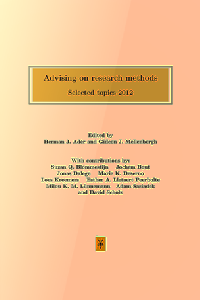Genre: Paper collection
Editors: Herman J. Adèr and Gideon J. Mellenbergh
First Edition: 2013
Softcover ISBN: 97-890-79418-21-3 (via Publisher)
Price: € 7,50 ($ 8,50)
eBook ISBN 97-890-79418-28-2
Price: €9,- ($ 10,25)
Website: www.jvank.nl/ARMSelected
Contents
Advising on research methods: Selected topics 2012 (eBook: ISBN 97-890-79418-28-2) results from a research master course Methodological Advice that was given at the University of Amsterdam, fall 2012 by Don Mellenbergh and Herman Adèr.
The objectives of the course were: (a) to acquire methodological knowledge that is needed for advising researchers in the behavioral and social sciences, and (b) to get experience with methodological consultancy.
The main material for the course was the book:
Advising on research methods: a consultant’s companion
by Herman J. Adèr and Gideon J. Mellenbergh (with contributions by David J. Hand).
The students had to fulfill various assignments, one of which was to write a paper on a topic that may come up during methodological consultancy.
In the beginning of the course, paper topics were selected from a long list of relevant methodological issues. Students wrote their paper either individually or in a pair. In the last case both authors had an equal share in the writing process and their names appear in alphabetical order in the table of Contents.
The publication process of drafting, submitting, reviewing, adapting and correcting was the same as in the production of any other edited paper collection.
Nine students participated in the course. They made the following contributions to the book:
Jonas Dalege and Loes Kreemers address the topic of measurement invariance with respect to a grouping variable (e.g., gender, experimentally manipulated groups). They discuss multi-group factoranalytic models to detect measurement invariance with respect to a grouping variable. Moreover, they present steps the consultant has to take when he or she is advising a client on a measurement invariance problem.
Marie K. Deserno introduces consultants to the two main types of models for the measurement of psychological and educational constructs, that is, Classical Test Theory (CTT) and Item Response Theory (IRT). She focuses on the differences between CTT and IRT. She concludes by pointing consultants to two problems that cannot be solved under CTT: Computerized Adaptive Testing and Differential Item Functioning, which is a special case of measurement invariance, can only be handled under IRT.
Milou K. M. Lünnemann discusses unit nonresponse in surveys. She defines nonresponse and describes the bias of nonresponse in survey studies. She ends her article with guidelines to prevent nonresponse in the design and implementation of survey studies, and to correct for nonresponse in the analysis of the data of survey studies.
Adam Sasiadek and David Scholz discuss the application of effect size measures in meta-analysis. They distinguish two ways of founding effect size measures, that is, measures based on means and measures based on correlations. Finally, they give guidelines for the application of effect size measures in meta-analysis.
Suzan Q. Blommestijn and
Esther A. Lietaert Peerbolte discuss outliers and extreme observations in empirical data. They explain the concepts of outlier and extreme observation. Moreover, they describe methods to detect outliers in univariate and bivariate distributions. Finally, they mention steps that the consultant can take when he or she advises clients on the handling of outliers.
Jochem Bout discusses questionable practices in empirical research. He describes some strategies to counteract these practices. Finally, he mentions guidelines for consultants that can be used to prevent clients to apply questionable research practices.
WebsiteDirectly from Publisher
Free downloadeReaderiPad/iPhoneKindleLend at the Public Library
 1278total visits,1visits today
1278total visits,1visits today

